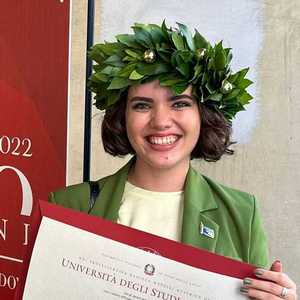Our testimonials: Yelyzaveta

Our testimonials: Yelyzaveta
Meet Yelyzaveta from Ukraine
Student of European and Global Studies
"This programme was not just about earning a degree; it was a gateway to explore the world through diverse perspectives. It was a transformative journey that fostered open-mindedness and a deeper cultural awareness"

About myself
In 2020, I was incredibly fortunate to be awarded the Padua International Excellence Scholarship, which allowed me to pursue my dream of obtaining a Master's degree at the University of Padua. With a bachelor's degree in journalism and over four years of experience in print and broadcast media, I chose to specialize in global communication policies, leading me to enrol in the European and Global Studies Master's program. I graduated with honours in 2022 after successfully defending my final thesis, titled " Emergency media support for media and journalists in Ukraine in times of war: GFMD experience."
My journey in media development began in 2021 when I started as a Communications Intern at the Global Forum for Media Development (GFMD) while pursuing my Master's degree. After completing my studies, I advanced to the position of Campaigns and Communications Manager, a role I currently hold there.
My passion lies in journalism and media development because I firmly believe that communication serves as a powerful tool for driving social change.
I enjoy learning new languages and have developed strong proficiency in several, including my native Ukrainian, along with English, German, Italian, and French.
I'm also a big fan of traveling and exploring new places. I feel lucky to have had the chance to visit many incredible Italian cities, which has added a lot to my cultural and personal experiences.
What are the best features of your degree?
My Master's program was a fantastic experience. It offered a diverse range of subjects, encompassing politics, sociology, communication, linguistics, business management, law, philosophy, and even economics. It was like having a buffet of academic disciplines to explore, allowing me to see how they interconnected in the real world.
What made this program even more appealing was the flexibility it provided. We had the freedom to choose optional courses that aligned with our personal interests. For me, the highlight was the opportunity to study art history in Italy, which felt like a dream come true.
However, the most remarkable aspect of the programme was its international atmosphere. It attracted students from all corners of the world, and this cultural diversity was truly enriching. Building friendships with people from different countries helped me discover our shared humanity, transcending cultural, religious, and political differences.
In summary, this programme was not just about earning a degree; it was a gateway to explore the world through diverse perspectives. It was a transformative journey that fostered open-mindedness and a deeper cultural awareness.
Application tips: how to build a successful profile
Creating a standout application profile is essential for securing admission to your desired program. Here what I would recommend:
- Motivation Letter: Your motivation letter should vividly convey your passion for the programme and its relevance to your personal growth and future aspirations. Share relevant experiences that have brought you to this point in your academic journey. Clearly articulate why the programme aligns with your background and career goals. Connect your past experiences, whether academic or professional, to the skills and knowledge needed for success in your chosen field. Showcase what sets you apart from other applicants, such as your distinctive qualities, experiences, or skills that will enrich the academic community. If you plan to change fields, provide a well-considered rationale. Detail how your previous experiences led to this decision and why the new field aligns with your interests and goals. Emphasize transferable skills from your previous field.
- Application Timeline: Identify all relevant deadlines and plan your application timeline carefully to avoid last-minute stress. Starting early allows time for refining your application materials. Don't hesitate to seek feedback from mentors, professors, or trusted friends. Their insights can help you polish your motivation letter and application materials.
What advice would you give to potential students thinking of studying Political Sciences in Padua?
Be ready to actively engage in practical seminars. These sessions often involve passionate discussions about various topics. Participation not only enhances your learning but also exposes you to diverse perspectives. Political Sciences demand extensive reading. Prepare to delve into a variety of texts, from classic political theories to contemporary policy documents. Reading widely deepens your understanding and informs your opinions. Professors are approachable and supportive, making it easy to seek help if the subject is new or initially challenging. Question everything you encounter. Continuously ask "why is it the way it is?" Challenge assumptions and explore multiple viewpoints. Critical thinking is vital in this field, sharpening your analytical skills. Keep abreast of current events in the political world, both locally and globally. Being informed about real-world developments enriches your studies and discussions. Collaborate with peers to gain fresh perspectives and teamwork skills. Maintain a healthy work-life balance. Taking breaks, pursuing hobbies, and practicing self-care are essential for your well-being and academic success.
What are some things people might not know about studying in Italy?
Studying in Italy can be an exciting and rewarding experience, but there are some lesser-known aspects of the journey that foreign students should be aware of:
- Bureaucracy Challenges: Navigating through them as a foreign student can be complicated and exhausting. However, it's crucial not to be discouraged by the bureaucracy because it eventually pays off. Be patient, persistent, and seek guidance when needed. Universities often have support services to help students with paperwork.
- Basic Italian Proficiency: While professors and fellow students may speak English fluently, having a basic understanding of Italian is invaluable. Whether it's at the post office, immigration office, train station, or supermarket, being able to communicate in Italian simplifies tasks and enriches your experience.
- Accommodation Challenges: Securing suitable accommodation in Italy, especially in cities like Padova, can be a competitive and time-consuming process. It's advisable to start your search well in advance, ideally months before your arrival. Many students arrive ahead of the academic year, making good rooms and flats scarce. Utilize university resources or online platforms to aid your search.
- Embrace Flexibility: Italy operates on its schedule, which may differ from what you're accustomed to. Be prepared for a more relaxed pace of life and adapt to changes gracefully. Embrace the cultural differences and enjoy the journey.
Tell me a bit about student life in Padua. What did you do for fun and where are your favourite places to spend time?
Unfortunately, my time here coincided with the COVID-19 pandemic, which did limit some of the opportunities for fun, but it was still an exciting period.
One of the highlights of student life in Padua is the vibrant cultural scene. I had the chance to enjoy concerts and events in the city's museums. These cultural outings provided a great way to connect with peers and explore the artistic side of Padua.
One absolute must-do in Padua is indulging in some gelato at Prato della Valle. It's a local tradition and a fantastic way to unwind and treat yourself, especially on sunny days. Another local specialty to savour is a glass of Spitz. It's a refreshing and unique drink that was actually invented right here in Padua. Enjoying a Spitz with friends after a long day of study is a wonderful way to relax and soak in the local culture.
While Padua itself has much to offer, its strategic location in the Veneto region opens up a world of exploration. The ease of traveling by train allows for exciting day trips to nearby cities like Venice and Verona.
Do you have any particular funny episode or memory when you were in Padua?
During my first semester at the University of Padua, I had the opportunity to participate in the Conversazioni CreAttive language exchange program. I was both a moderator for a group learning Russian and a member of a group studying Italian.
What struck me the most was the Italian students' fascination with Slavic cultures, especially their reaction to Ukrainian and Russian tongue twisters. It was quite comical to see how horrified they were by the complexity of these tongue twisters. The Russian language, with its abundance of consonants and unfamiliar sounds, stands in stark contrast to the melodious and vowel-rich Italian language. Nonetheless, the Italian students were enthusiastic and did remarkably well, despite the linguistic challenges.
Equally engaging were the Italian language exchange meetings where I, as a participant, delved into discussions about Italian films, music, literature, and even politics with fellow students. These conversations were not only enlightening but also quite humorous at times, as we shared our different cultural perspectives and opinions.
Thanks to my peers, I was left with a long list of Italian books to read, movies to watch, music to listen to, places to visit, and delicious Italian dishes to try. It was a fantastic way to immerse myself in Italian culture, and these interactions added a rich layer of laughter and camaraderie to my unforgettable time in Padua.
MEET OUR TESTIMONIALS
Many students shared their experiences at the University of Padua.
Find out their stories!


